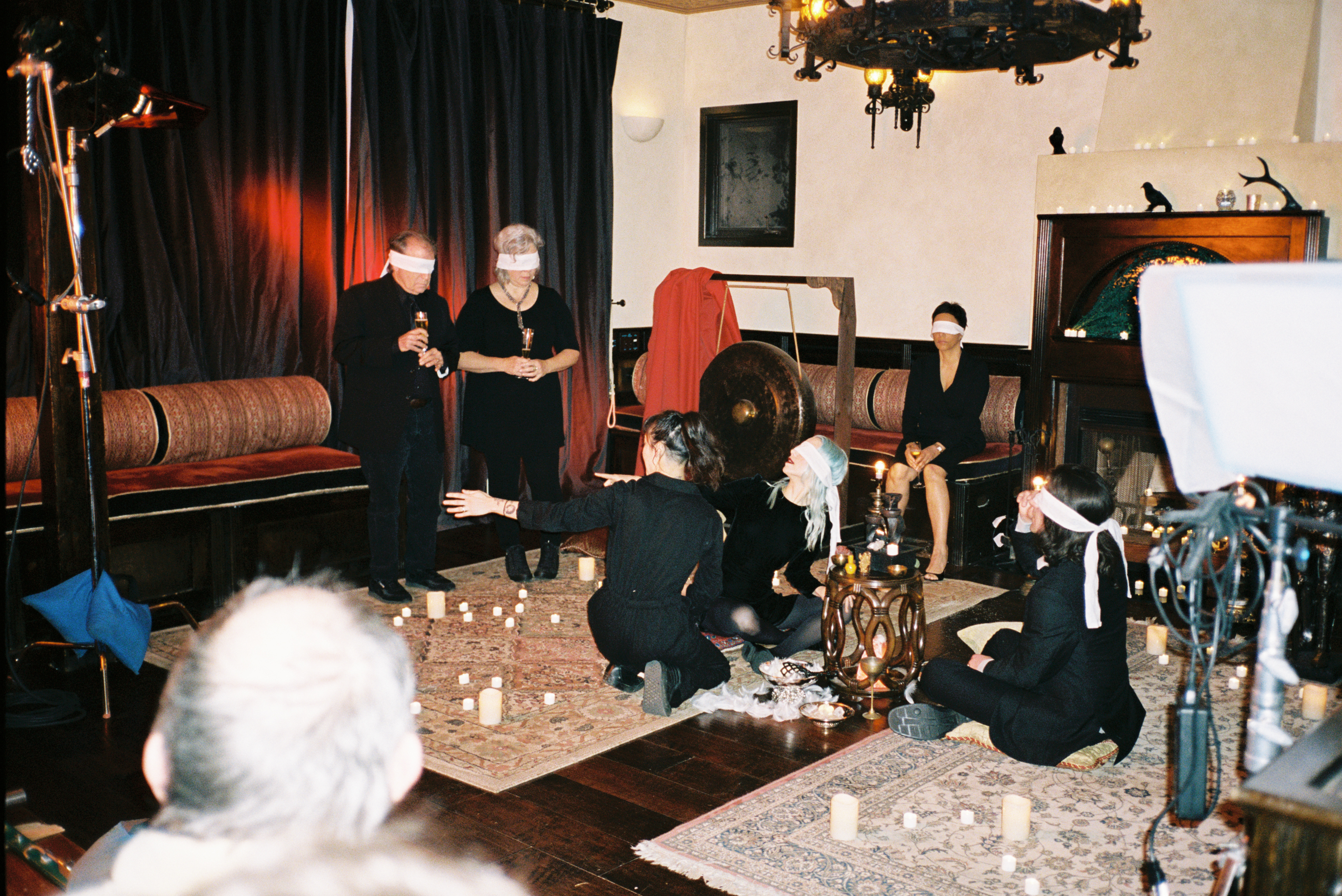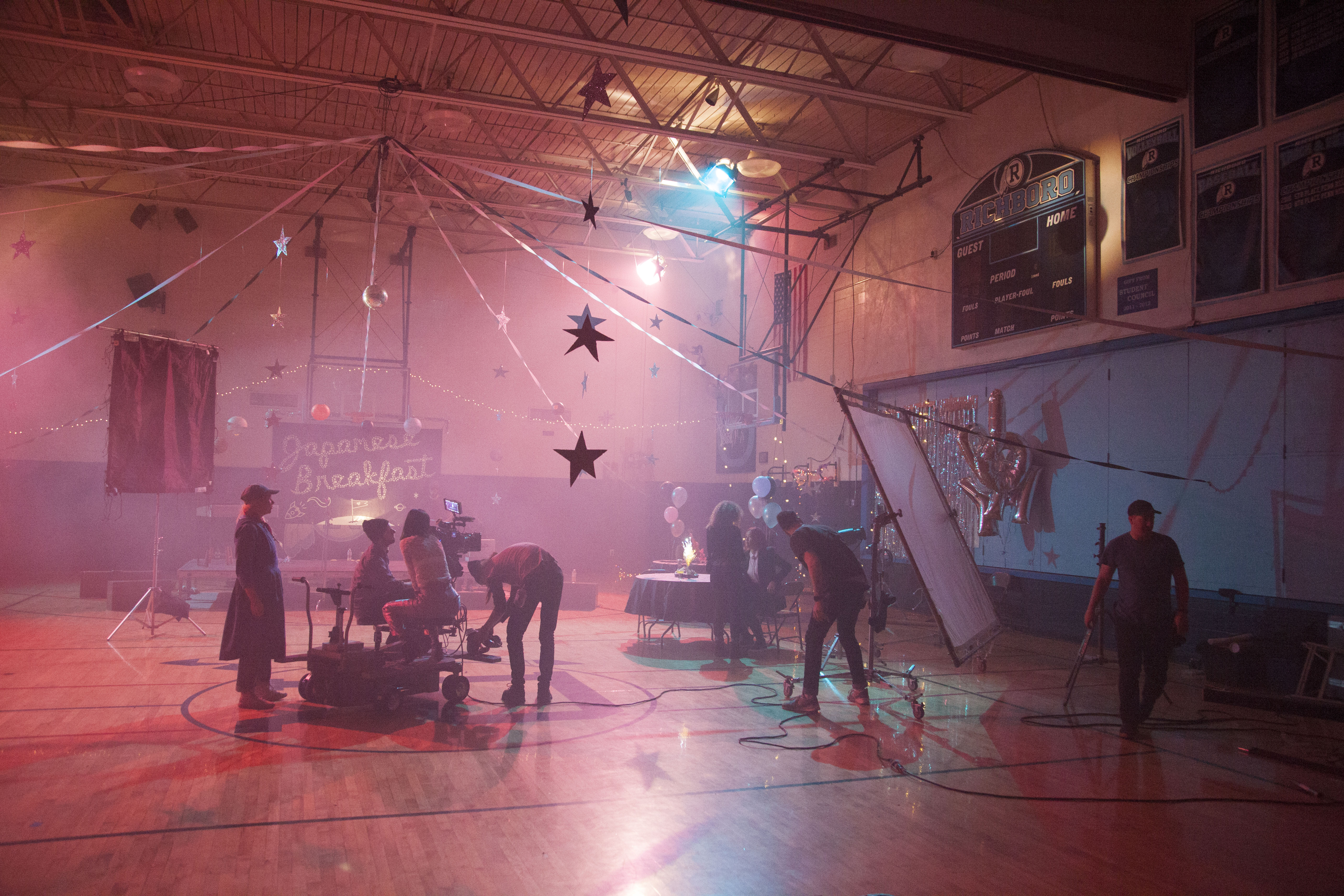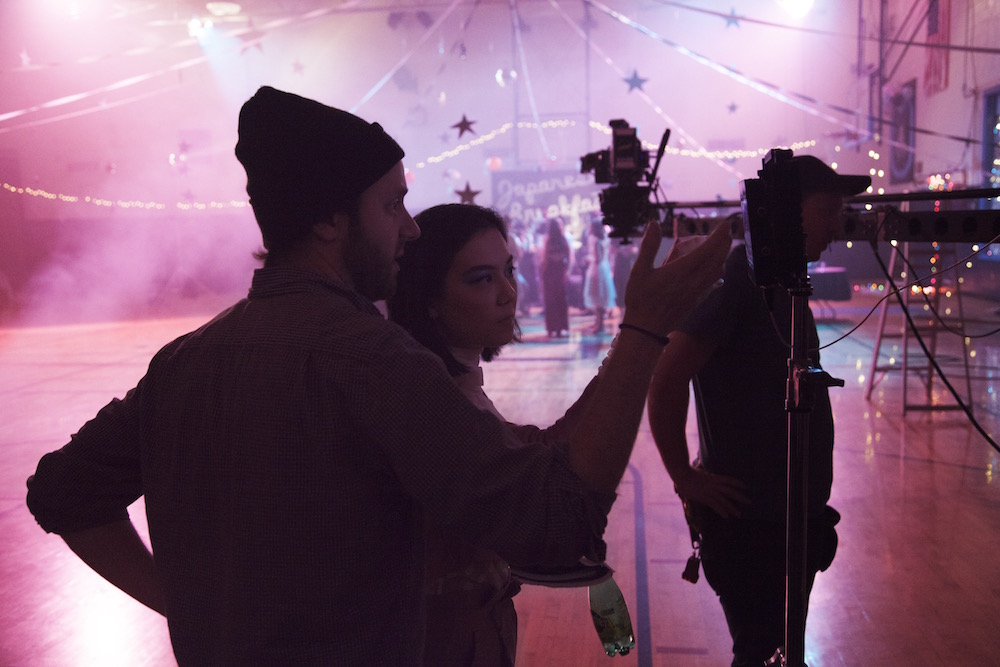Two days before Michelle Zauner was set to shoot the music video for “Boyish,” the location fell through. She had been planning an ambitious accompaniment to the song for more than a year, and had a large cast, crew, and several vans full of equipment all ready to go. Zauner had more than a professional investment in the shoot’s success. Not only was she directing the video; she’d written, performed, and recorded the song.
Japanese Breakfast, the Philadelphia-based artist’s musical outfit, has made waves among indie fans for a distinct sound that melds Zauner’s wistful voice with lo-fi guitar and shimmering string arrangements. Her debut, Psychopomp, and her 2017 follow-up, Soft Sounds from Another Planet, are dynamic works, hovering just above depths that teem with grief. Besides writing the songs, singing, and playing guitar, Zauner has directed almost all of Japanese Breakfast’s music videos, as well as a growing number for friends and labelmates including Jay Som, Charly Bliss, and Phoebe Bridgers and Conor Oberst. Pop stars from Prince to Beyoncé have taken active roles in their videography, but few indie rock musicians direct their own videos as consistently as Zauner has so far, or work as regularly as she does as a director for other artists.
Zauner’s interdisciplinary interests are evident in the decor of her Philadelphia apartment: Miyazaki posters ornamenting the wall, bookshelves filled with Toni Morrison and Louis-Ferdinand Céline, a happily disordered workbench. Though she is energetic and speaks rapidly, Zauner exudes a fiery intensity when she discusses her work. “You always feel like you could’ve done a better job,” she says. “And it just destroys you. I feel that way about everything I’ve ever made.” She’s from Oregon originally, but she believes it’s this seriousness that makes her feel more at home on the East Coast.
As soon as Zauner finished writing “Boyish,” a swoony exploration of rejection and self-doubt that became the second single off Soft Sounds, she knew that the video was going to feature a school dance. She called Adam Kolodny, a longtime collaborator, and spoke with him excitedly for two hours, as she often does when she has a film-related idea. They quickly realized they would have difficulty finding the budget to execute the project the way they envisioned it. An exclusive video release deal with Apple Music helped, and so did generous fans and friends, including 50 volunteer extras culled from Japanese Breakfast’s Instagram following. Another fan was a P.E. teacher who offered his school gym for free. Zauner says she and her team checked every box to confirm this proposal: did he need money, a signature, insurance? But the fan insisted—until 48 hours before the shoot, when he called to say that they would not be able to use the school after all.
Zauner and Kolodny thought the video had died inches from the finish line. “I just cried so much. Adam and I were just devastated,” she says. But after a series of motivational speeches from producers and frantic phone calls, Zauner’s husband, Peter Bradley, who also tours as the guitarist for Japanese Breakfast, contacted his middle school alma mater. In a last stroke of magnanimity from Richboro Junior High in Bucks County, Pennsylvania, the shoot was saved, and Zauner got to make the video she now calls her magnum opus. The “Boyish” clip has now screened at Raindance, the New Orleans Film Festival, the Philadelphia Independent Film Festival (where it won the award for best music video), and, most recently, SXSW. “The little video that could,” Zauner says with a grin.
The resulting video, awash in ethereal pinks and blues, both draws upon and subverts the angst and yearning of classic Hollywood dance scenes, from The Virgin Suicides to Napoleon Dynamite to Carrie. A trio of misfit girls strut into a celestial prom, with Japanese Breakfast as the hired band. The central character draws the gaze of the prom king, but ultimately turns toward Zauner, approaching the singer through a tunnel of applause as she has a rapturous vision of playing guitar in the center of a football field.
The video illustrates many of the aesthetic inclinations that define Zauner’s growing body of work as a director, from a striking use of color and gel lighting to a command of genre and camp. A meticulous planner, Zauner says she extensively mines movies for inspiration before every shoot, seeking reference points that she assembles into a mood board. For “Road Head,” another track off Soft Sounds, she studied Wong Kar-Wai’s use of frames within frames and took cues from the demons of Pan’s Labyrinth and Donnie Darko to tell an uncanny monster love story. When envisioning the Better Oblivion Community Center, a dystopian parody of a wellness center that was central to Bridgers and Oberst’s collaborative album of the same name, Zauner drew from Stanley Kubrick’s Eyes Wide Shut, Twin Peaks’ Great Northern Hotel, and Eternal Sunshine of the Spotless Mind’s Lacuna, Inc.
The virtual reality headsets that litter Zauner’s video for the Better Oblivion Community Center song “Dylan Thomas” were also inspired by a feature film, albeit more obliquely. “I wanted it to have this VR component,” she says. “I hated the movie the Wolf of Wall Street so much, and I had this running joke: I would have loved that movie, if at the end of it, there was just this scene with fat Leonardo DiCaprio in a corner in a VR headset with piss all over himself, and the entire movie was just a simulation in his mind. I think that’s how Wolf of Wall Street should have ended. I wanted the culmination of all those things to be what [Better Oblivion Community Center] was.”

Bridgers first met Zauner in 2017, when the two musicians played a show together in Germany. She recalls feeling impressed by the way Zauner seemed to act as her own manager: selling her own merch, booking her own travel, all while playing shows every night. “It made me feel like such a brat,” Bridgers says. “She’s so insanely organized, and was multitasking like crazy, talking about all her cool ideas for different projects relating to music.” Also, “She was wearing light-up sneakers. She just took it really seriously.”
About a year later, Bridgers and Oberst were going through treatment submissions for the “Dylan Thomas” video from various directors. They chose Zauner’s as their clear favorite, before they’d even realized who submitted it. On set, Bridgers observed the same meticulousness and work ethic that she’d admired in Zauner on tour. “It was by far the most organized video shoot I’ve ever been on,” she says. “I used to be on commercials and stuff. That shit runs six hours late. Michelle’s did not run one single hour late.”
Maintaining that level of professionalism can be a challenge. During the shoot for Charly Bliss’s “Capacity,” which depicts the band members driving through the desert after a bungled heist, Zauner recalls not going to the bathroom for the entirety of a freezing twelve-hour outdoor session. For the Japanese Breakfast song “Machinist,” the first video Zauner directed by herself, she and Kolodny had been given access to a warehouse that they could use for free whenever it was not in operation—that is, from 5PM to 5AM. That “was fucking the worst, hardest video I’ve ever made,” says Zauner. The heat did not run during these nocturnal sessions, and every day the crew had to assemble and disassemble a complex sci-fi set replete with flashing monitors, wiring, neon, and drainage piping.
“I think it’s actually just such a hard, heartbreaking medium, in a way, because there [are] just so many moving parts,” Zauner says. “So much about directing for me is just learning a shit-ton every time.”
Her first significant experience as a filmmaker, in fact, resulted in disappointment. Though Zauner tinkered with goofy camcorder productions and loved anime when she was young, she attributes her first genuine involvement in the medium to Homay King, one of her professors at Bryn Mawr College. King’s courses introduced Zauner to iconic foreign filmmakers like Jean-Luc Godard, Rainer Werner Fassbinder, Agnès Varda, and Wong Kar-Wai “Adam and I have huge boners for Wong Kar-Wai,” Zauner tells me matter-of-factly. “Like, we’re always kind of trying to just rip off Wong Kar-Wai.”
For her senior thesis, she wrote a short story and adapted it to film. The narrative centered on a young girl’s visit to an aunt dying of cancer, an experience drawn from Zauner’s own life. But instead of writing about a Korean aunt, like Zauner’s own, she made the characters white. “At the time I really felt like in order to be literary, or in order to make art that resonated with other people, it had to be from a white lens,” says Zauner. She laughs as she remembers a scene where the characters eat chicken and broccoli, the sort of meal she imagined a white family eating.

Zauner was so dismayed with the final product that she resolved to stop directing permanently. That didn’t last long. She graduated from Bryn Mawr and played in a few bands before starting Japanese Breakfast, at which point she knew she wanted total creative control over the project, including its music videos. Zauner admired artists like Björk and Grimes for creating idiosyncratic cosmologies and personas outside of their music, and for her, filmmaking was an essential part of this vision. Yellow K Records, the label that released Psychopomp, gave Zauner 500 dollars for her first music video. She created a concept for the album’s opener, “In Heaven,” a luminous inquiry into her grief over the death of her mother, and pegged Kolodny to direct it. The video is a fitting prelude to Zauner’s film oeuvre, juxtaposing jubilant scenes of neon-lit nightlife with delightfully weird tableaux vivants of Zauner and shirtless men.
Kolodny also directed Japanese Breakfast’s second video, “Jane Cum,” but Zauner continued to take an active role on set. When it came time to make the third Psychopomp clip, for a gem of a pop song called “Everybody Wants to Love You,” Zauner says, “[Adam] was like, ‘You know you’re directing. Maybe you should just take over.’” Galvanized by his encouragement, she co-directed “Everybody Wants to Love You,” which remains one of her favorite videos. After signing to Dead Oceans and releasing Soft Sounds in 2017, Zauner went on to be sole director for “Machinist,” “Road Head,” “The Body is a Blade,” and “Boyish.” Kolodny stayed on as director of photography.
Zauner’s videos embody many of the themes that also make her music so captivating: the weariness and doubt that arise from grief, the cheekiness about sex and desire, the strange reserves of hope in the midst of a harsh world. Her characters often walk the line between intimacy and isolation, navigating social settings with a sense of detachment. Whether it’s the trio of anti-Heathers at the prom in “Boyish,” or Eva Hendricks of Charly Bliss regarding a group of carousing men with jaded scorn in “Capacity,” the people in Zauner’s videos often find themselves alienated from conventional modes of pleasure. Sometimes characters opt for self-love, rejecting the prom royalty for glittering rock star dreams or stripping their blindfolds and gleefully fleeing the twisted thrills of the Better Oblivion Community Center. Other times, the limits of happiness become dangerous, suffocating. “Road Head” ends with blood splattering Tarantino-style over Zauner’s face and shoes as she kills the ghastly, oddly endearing creature of her affections.
The “Machinist” video addresses similar themes, exploring the feeling of longing as it relates to the frustrations and rewards of the creative process. “BUILD ME,” a computer screen suddenly implores to Zauner’s zonked-out inventor character, who happens to be wearing light-up sneakers, just as Zauner was when Phoebe Bridgers first took note of her work ethic in Germany. So begins a doomed robot love story, with Zauner struggling to create a physical form for her new software companion, which ends with the director suspended in a net of her own tangled cables, no closer than she was at the outset. Sometimes, your vision devours you, the “Machinist” video seems to say. And sometimes, that willingness to subsume yourself into your work—to be devoured by it—is the vision itself.





